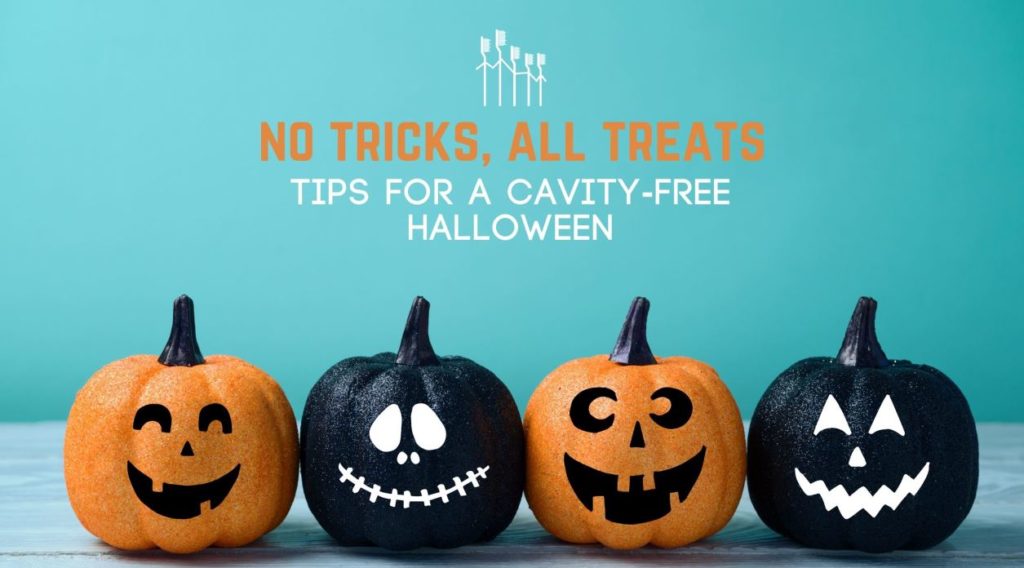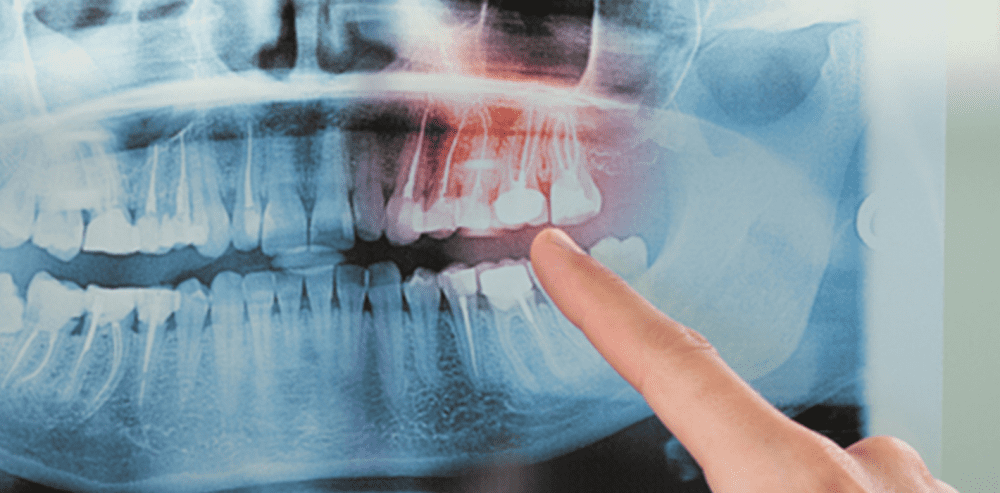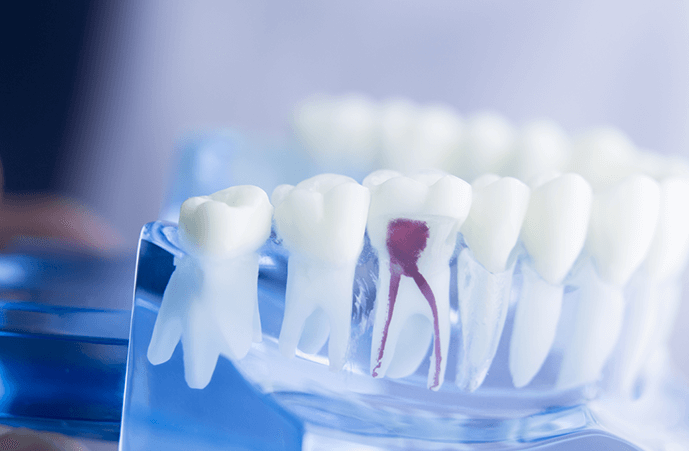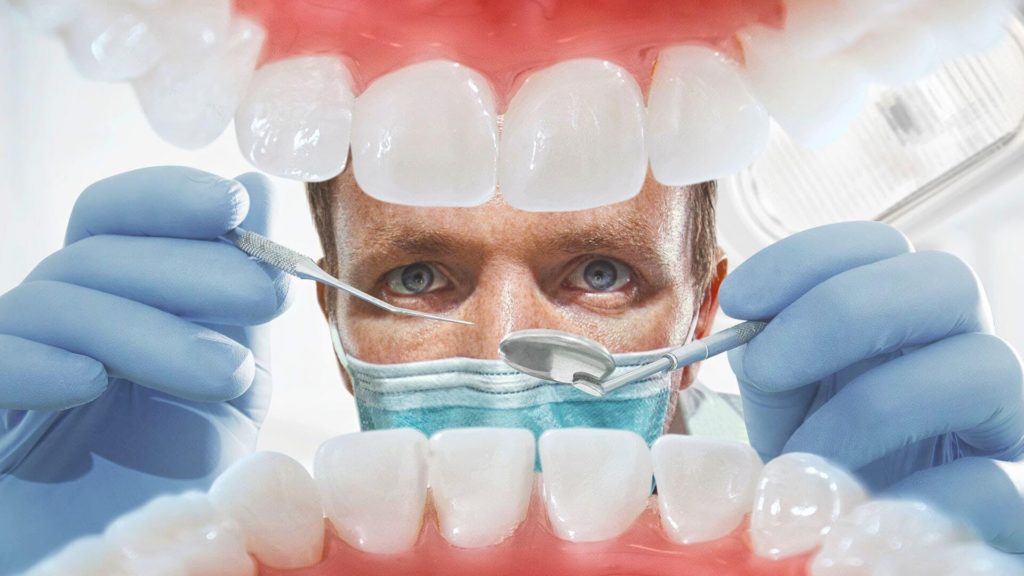
Halloween is the scariest holiday — for your teeth. During this holiday season, it might feel impossible to keep your kids (and yourself … I know it’s impossible for me to stay away from my favorites) away from the sweets. Use these tips to limit candy consumption and keep your kid’s teeth healthy and happy for a cavity-free Halloween.
Many people know that eating too much of anything is a bad idea, especially during the Halloween and Holiday Seasons! Cutting down on sugary snacks is one way to keep your pearly white smile healthy. Unfortunately, sometimes it can go sour and tooth decay can happen. Do you know how?
Your Sweet Tooth and Decay
When you eat sugar, there is a series of events that begin to happen as soon as you pop that sweet treat in your mouth; however, sugar alone does not cause tooth decay. If your teeth are not properly cleaned, the tooth enamel can begin to wear down and cavities can form.
Cavities can Develop
Your mouth is filled with hundreds of bacteria, many of which benefit the health of your teeth; however, some are harmful. These harmful bacteria feed on the sugars that are left on your teeth when they are not brushed after that sugary snack. They create acid that destroys your tooth enamel. Your tooth enamel is the shiny, outer layer that protects your teeth; if this layer becomes compromised, decay and cavities can form and leave tiny holes in your teeth. If the cavity isn’t treated properly, additional issues, such as gum disease and tooth loss can occur. See how your sweet tooth can go sour, quickly?
Preventing Cavities is Pretty Simple
- Brush your teeth regularly, especially after sweet treats and before bedtime
- Avoid sugar when possible (this includes snacks, gum and beverages)
- Eat healthy foods that are rich in fiber
- Make regular trips to visit your dentist
Have a Cavity-Free Halloween
With Halloween just around the corner, which for most children means bags of free candy and easy access to all kinds of sweets. It’s also a pretty tempting holiday for adults. Here are 5 ways everyone can stay mouth healthy during your cavity-free Halloween and every day.
Stay away from things that stick
Besides how often you snack, the length of time sugary food is in your mouth plays a role in tooth decay. Unless it is a sugar-free product, candies that stay in the mouth for a long period of time subject teeth to an increased risk for tooth decay. The stickier candies, like taffy and gummy bears, also take longer to get washed away by saliva.
Think twice before picking hard candies
Besides how often you snack, the length of time sugary food is in your mouth plays a role in developing cavities. Unless it is a sugar-free product, candies that stay in the mouth for a long period of time subject teeth to an increased risk for tooth decay.
Try and eat candy with meals
We know candy can be hard to resist, especially after all that hard work trick or treating for it! If you can, try and eat Halloween candy and other sugary foods with meals or shortly after mealtime. That’s because saliva production increases during meals and helps cancel out acids produced by bacteria in your mouth and helps rinse away food particles.
Avoid beverages with added sugar
When teeth come in frequent contact with beverages that contain sugar, the risk of tooth decay is increased. Drinking water can also help prevent tooth decay and who needs extra calories from sugary sweet drinks?!
Chew Gum that has the ADA Seal
Instead of candy, consider gum. Studies show that chewing sugarless gum for 20 minutes after meals helps reduce tooth decay, because increased saliva flow helps wash out food and neutralize the acid produced by dental plaque bacteria.
Remember, Candy Causes Tooth Decay
Here’s the recap: The outer layer of our teeth is called the enamel. It’s a resilient and shiny substance on the surface of your teeth that keeps the inner layer of your teeth, the dentin, safe from damage. But when sugars mix with bacteria in our mouths, an acidic environment leaves enamel vulnerable to harm and decay.
Remember, Not All Candy is Created Equal
What are the worst and best to give Trick-or-Treaters to preserve the health of their teeth for a cavity-free Halloween?
WORST:
- Gummies, Taffy, and Caramels: Anything containing chewy or sticky ingredients is harder to remove from teeth and can easily lead to cavities
- Hard Candy: Like chewy candy, they are hard to fully clean off of teeth
- Sour Candy: As it is highly acidic and can erode the enamel of the teeth
BEST:
- Sugar-Free Candy: While it’s less fun, you can rest assured knowing that damage won’t be done to teeth
- Sugar-Free Gum: A great way for older kids to keep breath fresh and teeth clean
- Chocolate, especially DARK Chocolate: It’s the most easily removable of all sugary candy, but remember the extra ingredients, like caramel, may cause problems!
Handy Halloween Candy Facts
With Halloween comes a ton of parties, trick or treating, and, of course, sweets. 4% of all candy consumption occurs on this spooktacular holiday. We’ve gathered up some fun facts in our “Halloween Candy Facts” below.
Consider our tricky tips below for a safe and healthy Halloween season:
- Only 4% of candy consumption occurs on the day of Halloween
- Almost 3 out of every 4 households will be handing out Halloween treats in the U.S. this year!
- Experts estimate that $3.1 Billion will be spent on Halloween candy this year
- 25% of the candy industry’s revenues come from Halloween-related sales
- The average household will spend $44 just to purchase Halloween candy
- Consumers are seeing a price increase of around 13% over their bulk candy purchases for Halloween 2021
- 76% of households serve Hershey’s Kisses at Halloween
- Candy corn is the most popular candy-related search for search engines
- 3 out of 4 households will put the purchased Halloween candy in-sight at home
- From a health standpoint, it’s actually better to eat more candy at once than spread it out during the day; because the added saliva cancels out the acids that can ruin teeth
- Many candies have more than 15 ingredients in them, with many of them being different types of sugars
- Pro Tip: Freeze It!! Chocolate can last up to 6 months in the freezer
Sorting after Trick or Treating
Many families return home with their sweet loot and start a sorting ritual. If you don’t typically do this, consider it this year. Throw out any candies or treats that aren’t properly wrapped. Recent articles are pointing more and more toward drugs being presented as candy. Protect your family by making sure anything they consume won’t hurt their mouth. Remember, if your goal is a cavity-free Halloween and your haul is excessive, consider putting some of your chocolate in the freezer. It will keep nicely for up to 6 months.
Battling Decay After All the Sweets
If you want to be sure you or your family members’ teeth don’t suffer extreme consequences for all that Halloween candy consumption, then encourage and increase these healthy oral habits even more than you already do to ensure a cavity-free Halloween:
- Be sure you are brushing your teeth for 2 minutes twice daily. Around Halloween, it might even be worth it to brush after eating the candy, or a third time midday.
- Increase flossing from 1 to 2 times daily for the week following Halloween.
- Even if you don’t normally choose to use mouthwash, doing so around Halloween and throughout the holidays is a great idea. It can keep sugars at bay and strengthen teeth with the fluoride often included in it.
- Drinking lots of water can help keep your mouth flushed out and sugars to a minimum.
- Eating healthy foods to balance out sugar intake is a wonderful way to keep blood sugar from spiking and your teeth free from decay. Munching fresh apples, carrots, celery, and other fibrous produce can actually scrub away plaque buildup and sugars in your mouth, and offer hydration that has been depleted.
- Consider scheduling teeth cleaning after Halloween or in January following all the major Holidays of the year. If any damage is done, we’ll be sure to find it and prevent it from getting any worse.
Preventing Tooth Decay:
Preventing the unhealthy aftermath of your sweet tooth is important and the best way to do that is to take proper care of your teeth and have a cavity-free Halloween. Limiting the sugar intake in treats and snacks is obvious, but when we talk to our patients, we find out that sometimes the sugars sneak up on them (and they don’t even realize it)! That’s right, gum and beverages are just as guilty at leaving their marks on your teeth. If you drink soda, it doesn’t make any difference whether it’s sugar-free or not because these drinks will leave acid on your teeth that begin to wear down the enamel too. Opting for healthy choices, like water or milk are always better options for your oral health (just make sure they’re not “flavored water”… see how sneaky??)
Brushing and flossing away the plaque (twice each day) will make it harder for a cavity to develop because you are strengthening your enamel at least twice every day. By adding regular visits to your dentist for thorough dental exams, you’re well on your way to preventing cavities and keeping your mouth healthy.
GPS Dental Wishes You a Cavity Free Halloween
With these tips, you’re sure to have a wonderful time this Halloween Weekend without compromising on the health of your mouth. We hope everyone has a safe and wonderful Cavity-Free Halloween!
Dr. Gary P. Skrobanek’s experienced and friendly team at GPS Dental offers affordable dental care for all ages in San Antonio, TX area. Our Brooks City Base dentist office is conveniently located and offers early morning appointment times Monday through Friday to meet your needs. At GPS Dental, we promote dental health awareness to our patients and provide most dental services, from family and general dentistry to dental implants, sleep apnea, TMJ / TMD Treatment, cosmetic dentistry and much more. We accept most dental insurance plans and offer affordable financial solutions for any budget. Call us at 210-633-3477 to make an appointment.














